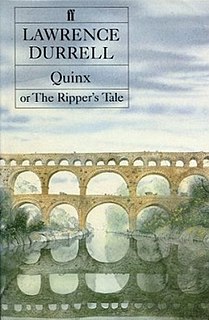
Lawrence George Durrell was an expatriate British novelist, poet, dramatist, and travel writer. He was the eldest brother of naturalist and writer Gerald Durrell.
Constance is a female given name that derives from Latin and means "constant." Variations of the name include Connie, Constancia, and Constanze.

Constantine Peter Cavafy was an Egyptiot Greek poet, journalist and civil servant. His consciously individual style earned him a place among the most important figures not only in Greek poetry, but in Western poetry as well.
Jacques Lacarrière was a French writer, born in Limoges. He studied moral philosophy, classical literature, and Hindu philosophy and literature. Professionally, he was known as a prominent critic, journalist, and essayist.

Justine, published in 1957, is the first volume in Lawrence Durrell's literary tetralogy, The Alexandria Quartet. The first in the tetralogy, Justine is one of four interlocking novels, each of which tells various aspects of a complex story of passion and deception from differing points of view. The quartet is set in the Egyptian city of Alexandria in the 1930s and 1940s, the city or Alexandria itself as described by Durrell becoming as much of a complex character as the human protagonists of the novels. Since first becoming available to the public and reviewers in 1957, Justine has inspired what has been called "an almost religious devotion among readers and critics alike." It was adapted into the film of the same name in 1969.
Prince of Darkness may refer to:

André Aciman is an Italian-American writer. Born and raised in Alexandria, Egypt, he is currently distinguished professor at the Graduate Center of City University of New York, where he teaches the history of literary theory and the works of Marcel Proust. Aciman previously taught creative writing at New York University and French literature at Princeton and Bard College.

Bitter Lemons is an autobiographical work by writer Lawrence Durrell, describing the three years (1953–1956) he spent on the island of Cyprus. The book was awarded the Duff Cooper Prize for 1957, the second year the prize was awarded.

Monsieur, or The Prince of Darkness (1974), is the first volume in Lawrence Durrell's The Avignon Quintet. Published from 1974 to 1985, this sequence of five interrelated novels explore the lives of a group of Europeans before, during, and after World War II. Durrell uses many of the experimental techniques of metafiction that he had integrated into his Alexandria Quartet, published 1957 to 1960. He described the later quintet as a quincunx.
The Avignon Quintet is a five-volume series of novels by British writer Lawrence Durrell, published between 1974 and 1985. The novels are metafictional. He uses developments in experimental fiction that followed his The Alexandria Quartet (1957-1960). The action of the novels is set before and during World War II, largely in France, Egypt, and Switzerland.

Sebastian, or Ruling Passions (1982), is the fourth volume in The Avignon Quintet series by British author Lawrence Durrell, which was published from 1974 to 1985. This novel is set mainly in Switzerland immediately after World War II. It continues the story of Constance and a Gnostic cult, which was introduced in the first novel of the quintet, Monsieur (1974).

Balthazar, published in 1958, is the second volume in The Alexandria Quartet series by British author Lawrence Durrell. Set in Alexandria, Egypt around World War II, the four novels tell essentially the same story from different points of view and come to a conclusion in Clea. Balthazar is the first novel in the series that presents a competing narrator, Balthazar, who writes back to the narrating Darley in his "great interlinear."

Mountolive, published in 1958, is the third volume in The Alexandria Quartet series by British author Lawrence Durrell. Set in Alexandria, Egypt, around World War II, the four novels tell essentially the same story from different points of view and come to a conclusion in Clea.Mountolive is the only third person narrative in the series, and it is also the most overtly political.

Livia, or Buried Alive (1978), is the second volume in British author Lawrence Durrell's The Avignon Quintet, published from 1974 to 1985. Durrell has described the novels as "roped together like climbers on a rockface, but all independent. .. a series of books through which the same characters move for all the world as if to illustrate the notion of reincarnation." The description of this form for the quintet actually appears in Livia. The first novel of the quincunx, Monsieur, received the James Tait Black Memorial Prize in 1974.

Quinx, or The Ripper's Tale (1985), is the 5th and final volume in Lawrence Durrell's "quincunx" of novels, The Avignon Quintet, published from 1974 to 1985. It explores the activities of Constance, Aubrey Blanford, Robin Sutcliffe, Lord Galen, and most of the other surviving characters as they return to Avignon and Provence in the immediate aftermath of World War II.
A pentalogy is a compound literary or narrative work that is explicitly divided into five parts. Although modern use of the word implies both that the parts are reasonably self-contained and that the structure was intended by the author, historically, neither was necessarily true: in fact, a pentalogia could be assembled by a later editor, just as Plotinus's Enneads were arranged in nines by Porphyry in order to create an overarching structure of six which would express the idea of perfection.
Professor David Gwyn Williams, usually known simply as Gwyn Williams was a Welsh poet, novelist, translator and academic.
Henry Robin Romilly Fedden, CBE, (1908–1977) was an English writer, diplomat and mountaineer. He was the son of artist Romilly Fedden and novelist Katherine Waldo Douglas.
Clea Badaro (1913–1968) was an Egyptian painter and designer who lived most of her adult life in Alexandria, Egypt.











